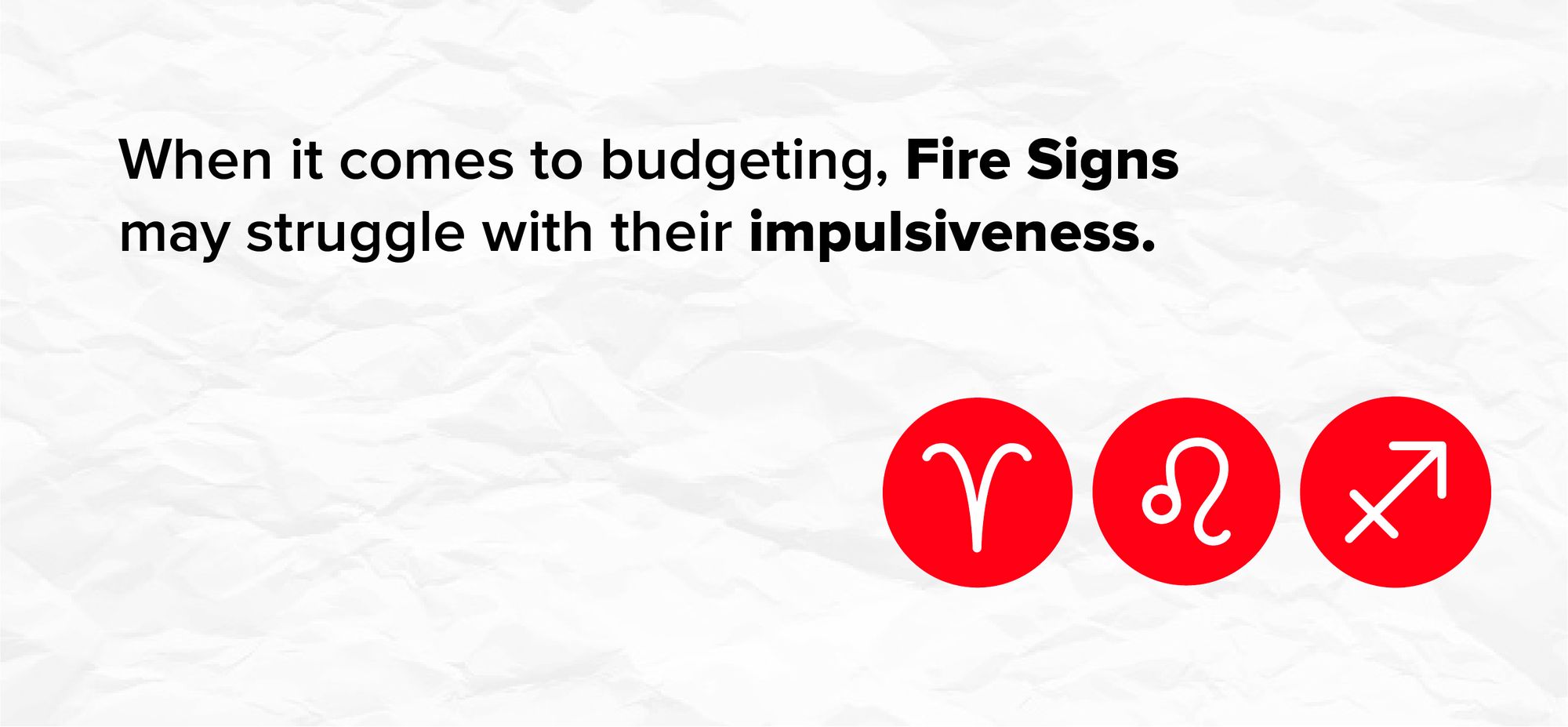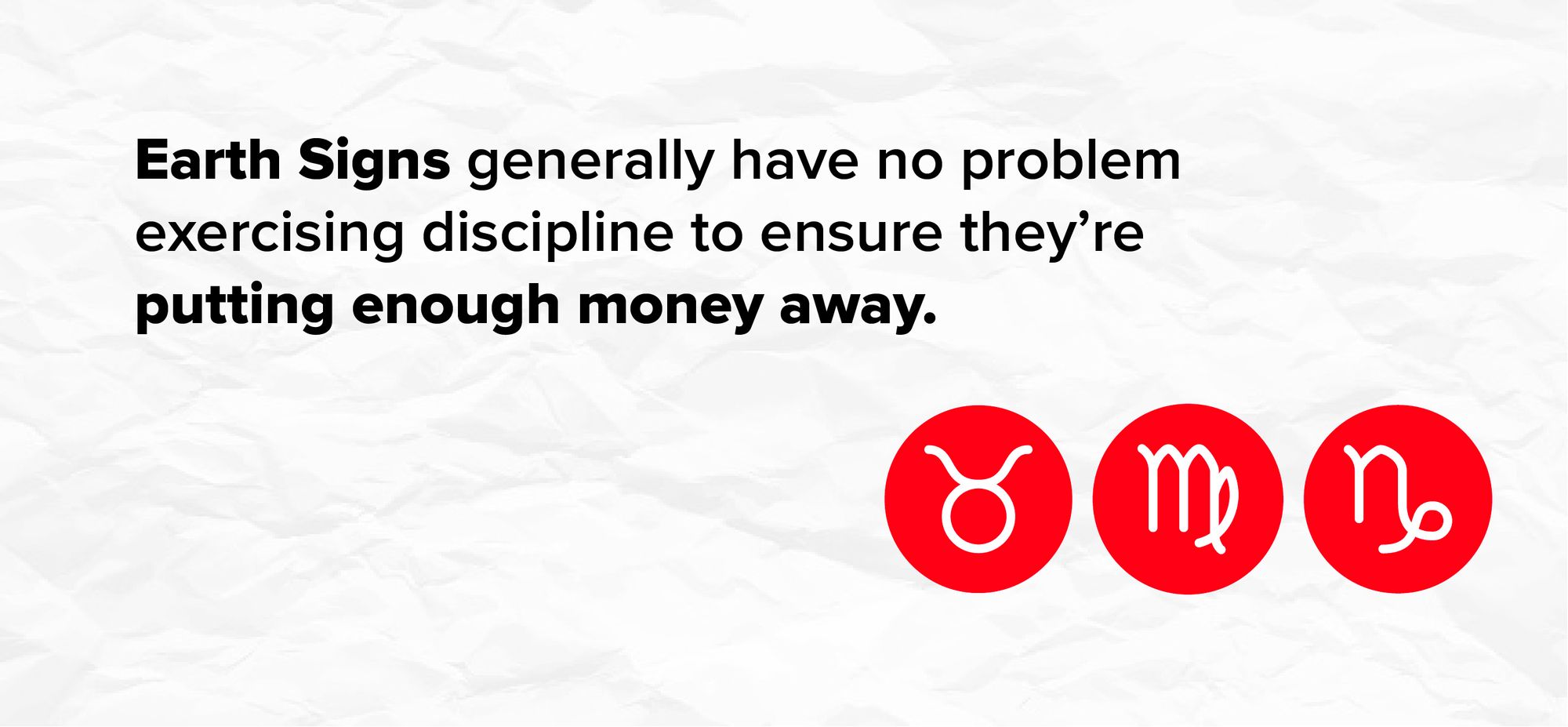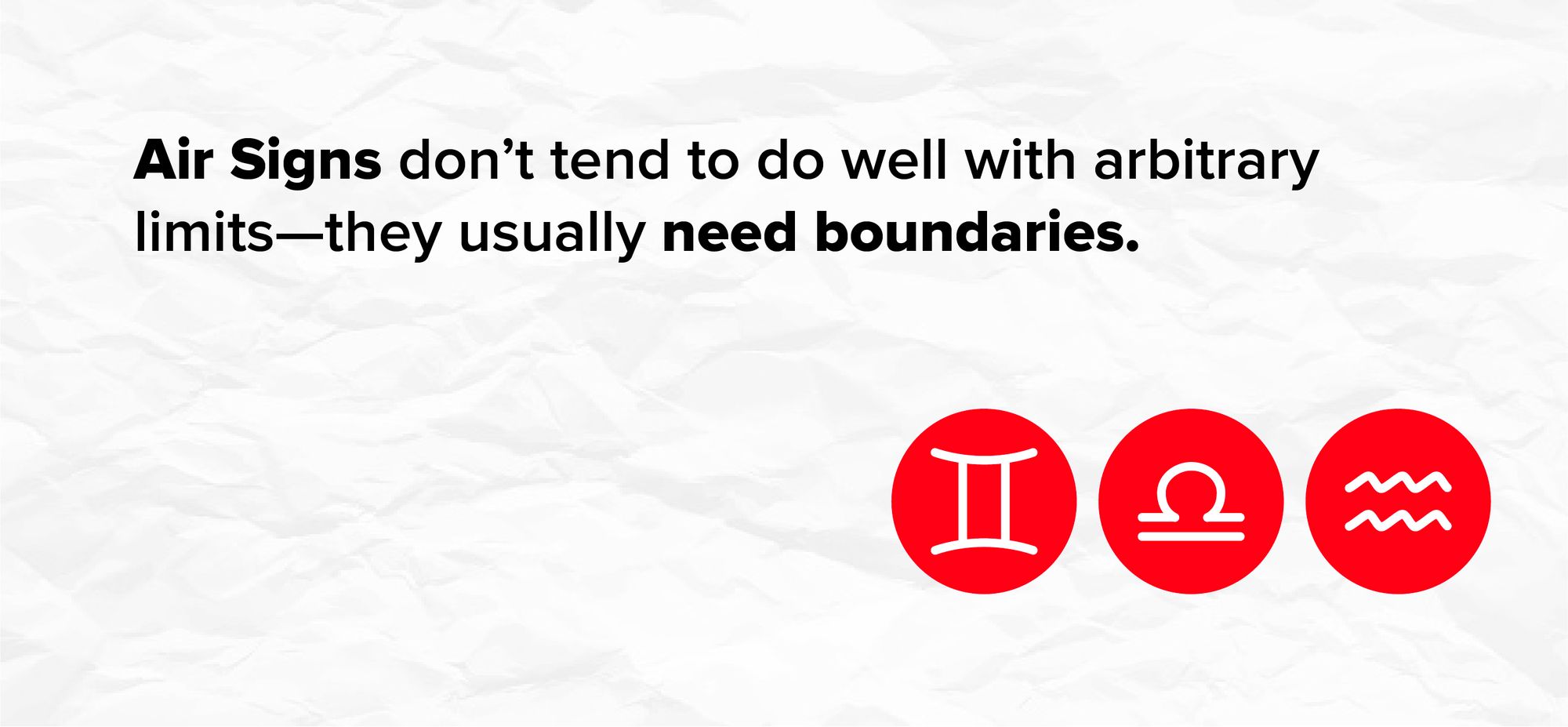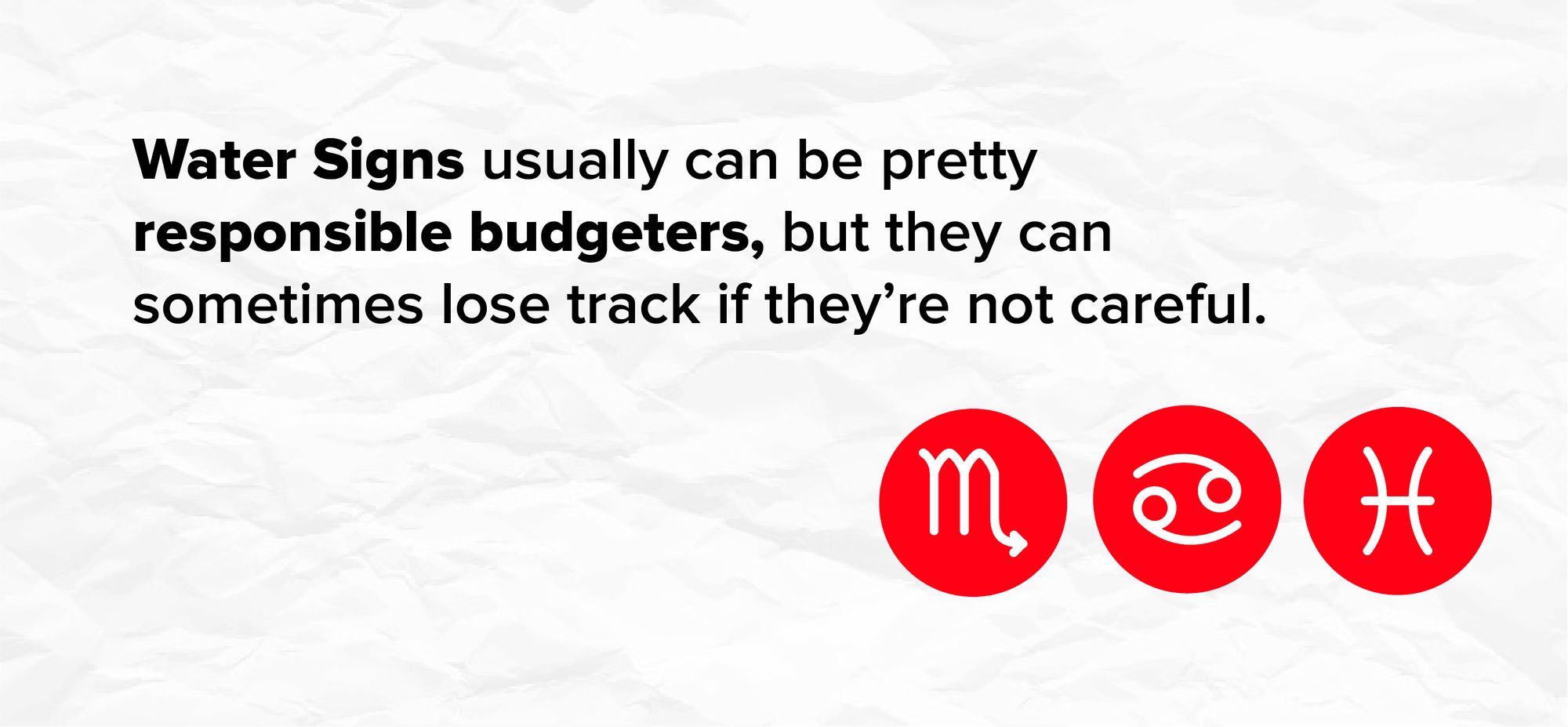The Signs as Budgeting Styles
Don’t shoot the messenger, kay?
Whether you derive life advice and guidance from the astrological calendar or your Google calendar (a capricorn wrote this), budgets can be hard for everyone. So suspend your disbelief for a moment and learn about some budgets that may be best suited to your star sign below.
Who knows—maybe you’ll find the perfect budget for you. Or maybe you’ll just learn about some budgeting styles? Or maybe you’ll just remember to review your finances today. Either way, you’re welcome.
Take it or leave it. Love it or hate it. No questions. Only budgets.
The Fire Signs:

Aries, Leo, Sagittarius
The Fire Signs are typically, well, fiery. They can be wild cards. They can be famous for trusting their intuitions and—rather than learning from their mistakes—simply rolling with the punches if a plan doesn’t pan out as they intended. They’re generally the proud, brave, chaotic neutrals of the zodiac.
Inside every Fire Sign lives two wolves. One wolf has ambitious financial goals, is strict, and loves a granular budget. The other wolf wants many shiny things right now!!! This instant!!!
And often, only shiny will do.
When it comes to budgeting, Fire Signs may struggle with their impulsiveness and might make use of a strategy like the Anti-Budget. When a paycheque comes in, set aside a set percentage of your income (which you use for savings, paying bills, buying food, etc.) and then keep the rest aside for spending. No finicky tracking of expenses, just a general sense of balance.
However, the Anti-Budget relies on the premise that you still spend less than you earn. So once that big portion of income is set aside to pay for important things, spending that remaining cash should never put you in debt. To help make sure you always stay in the black, set a “hard cap”—a number which you will never, ever go over.
With the Anti-Budget, if you hit your cap, chill out for a second, and wait until your next paycheque comes in before putting yourself in spendy situations. And maybe take it a bit easy next time, eh?
The Earth Signs: the Savings-First Budget

Taurus, Virgo, Capricorn
Earth signs are usually very practical—sometimes to a fault—but they are still generally susceptible to materialism. They can love luxurious things and would likely be found purchasing very expensive boring things, like pens, office chairs, or accounting software.
The good news is that earth signs tend to plan for these expenditures. If an Earth Sign wants to buy a new piece of jewelry, they’re weighing its value as an heirloom piece. They budget, plan ahead, and splurge on goods that are built to last.
Earth Signs might be well suited to the “Savings-First Budget”. Earth Signs generally have no problem exercising discipline to ensure they’re putting enough money away—in their retirement account, maxing out their TFSAs, hitting their investment targets—before allocating a safe amount of cash to buy something that adds more luxury to their everyday life.
Ever the pragmatist, this means Earth Signs may go months without purchasing anything especially “fun”—especially if they’re saving up for something big.
On the upside, this restrained style of budgeting means Earth Signs may rarely find themselves strapped for cash. On the downside, it means Earth Signs may spend less time indulging and having fun than other signs—which we all deserve, sometimes!
The Air Signs: The Zero-Based Budget

Gemini, Libra, Aquarius
Air Signs can be social butterflies. They are generally entertainers that themselves love being entertained. Seriously, find me a Libra that hates their own birthday party. Impossible! Like Fire Signs (lookin’ at you, Leos), Air Signs bring a needed (but sometimes over the top) levity to the world of personal finance. They’re liable to divvy up a paycheque with the best of intentions, only to wind up overspending to buy another round at the bar.
Being social butterflies, Air Signs may be especially in danger of impulse spending. Another bottle of wine, another round of snacks, an impromptu coffee date with an old friend—if these costs aren’t budgeted for, our friendly neighbourhood Air Signs can wind up in trouble.
The budget that may be perfect for Air Signs is the Zero-Based Budget. Air Signs don’t tend to do well with arbitrary limits—they usually need boundaries. So by allocating funds after each paycheque into specific places—investment accounts like TFSAs, long term high interest savings accounts, etc.—they can spend the rest of the month living off whatever remains of their balance.
If they’ve got just $50 and a weekend of social plans ahead of them, they know they’ll need to be careful or risk running out of money (or charging expenses to a credit card, which is usually never, ever a good idea).
The Water Signs: The 50/30/20 Budget

Pisces, Cancer, Scorpio
Water Signs tend to be gentle, sensitive types that can worry often about money. But despite their careful planning and anxiety about their finances, they’re not generally immune to the occasional impulse purchase. They may find themselves feeling embarrassed or regretting their purchases more frequently than other signs (like Fire signs who may have literally zero remorse over bad financial decisions; and those Earth Signs that may never admit to themselves or anyone else they made a mistake in the first place!).
Water Signs might benefit most from a gentle guiding hand when it comes to financial management. Generally speaking, Water Signs can tend to be responsible with their money; they usually have a plan and genuinely want to stick to it—but sometimes, they can get caught in the weeds and lose track of their spending.
If the ratio starts to slip too far in one direction, say they begin to overspend on things they want but don’t need, it’ll be easy to tell—and they’ll be able to quickly and accurately course correct.
Need a Buffer? Meet the MogoCard
We all need a good accountability buddy to help keep our spending on track.
Oh—and did we mention the MogoCard is totally free? 😄🌲
| GET MY FREE MOGOCARD |
This blog is provided for informational purposes only.
*Trademark of Visa International Service Association and used under licence by Peoples Trust Company. Mogo Visa Platinum Prepaid Card is issued by Peoples Trust Company pursuant to licence by Visa Int. and is subject to Terms and Conditions, visit mogo.ca for full details. Your MogoCard balance is not insured by the Canada Deposit Insurance Corporation (CDIC). MogoCard means the Mogo Visa Platinum Prepaid Card.
1-Based on an online survey of active MogoCard users by Mogo Inc. conducted between July 13, 2021 and July 16, 2021, with 1,446 respondents to a combination of multiple choice and fillable text box questions. 91% of respondents agreed that the MogoCard can help them better control their spending. 66.5% of respondents reported that they were spending less on discretionary spending now that they were using the MogoCard, with respondents reporting that they believed to have an average savings of $201 per month (based on 902 respondents who specified an amount and excluding 60 respondents who did not specify any amount).